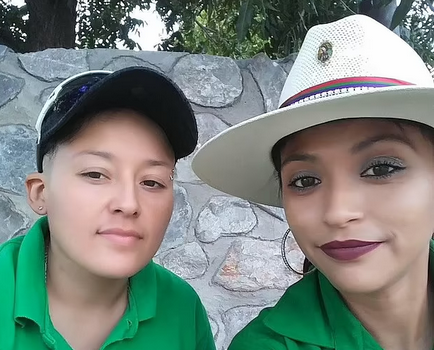A Texas lesbian couple was found dismembered in two garbage bags in Ciudad Juárez, a Mexican border town. The married couple identified as Julissa Ramírez and Nohemí Medina Martínez were on a family visit to Mexico.
The authorities found the dismembered bodies dumped 17 miles apart from each on a stretch on road on Sunday.

Couple Was Visiting Family in Mexico
The New York Post reported that the couple, who tied the knot, last year as last seen by their family a day before their mutilated bodies were discovered.
El Diario, a Spanish language newspaper, reported that the bodies were discovered covered in garbage bags dumped on a highway outside Ciudad Juárez, just over the border from the couple's El Paso home.
The Daily Mail reported that the Chihuahua Committee for Sexual Diversity Director Karen Avizo revealed that the couple have three children, including two girls and a boy.
Believing it to be a hate-crime Avizo believes that the twin murder is likely to go unsolved like most hate crimes in the Mexico's LGBTQ community.
"The concern is that authorities will absolutely do nothing. We feel like we are treated like second-class citizens and that we really don't matter," Arvizo said.
Two More Bodies Found
On Monday, bodies of two other women were found dumped at an intersection in the Patria-Zaragoza neighborhood by the Ciudad Juárez authorities. The victims were found to be tortured and shot.
While one of the women was found dead on the spot, the other died who at the hospital following the injuries from gunshot.
As per El Diario, out of the 65 homicides reported so far this year in Ciudad Juárez, eleven victims have been identified as women. According to the data released by the Chihuahua State Office of the Attorney General, 1,424 of the 2,476 homicides that were registered in the state in 2021 took place in Ciudad Juárez, about an average of four per day.
The outlet reported hat Ciudad Juárez district attorney Jesús Carrasco relates most of the homicides to smaller drug gangs like 'Los Mexicles,' 'Doble A,' 'Los Aztecas' and 'La Nueva Empresa.'
"We don't see the big cartels as active or active in the city, but we do see the gangs. We do see these groups or small cells that separated from the gangs, that generated new groups and there could be a series of conditions between them that could be generating these intentional deaths," Carrasco said.









